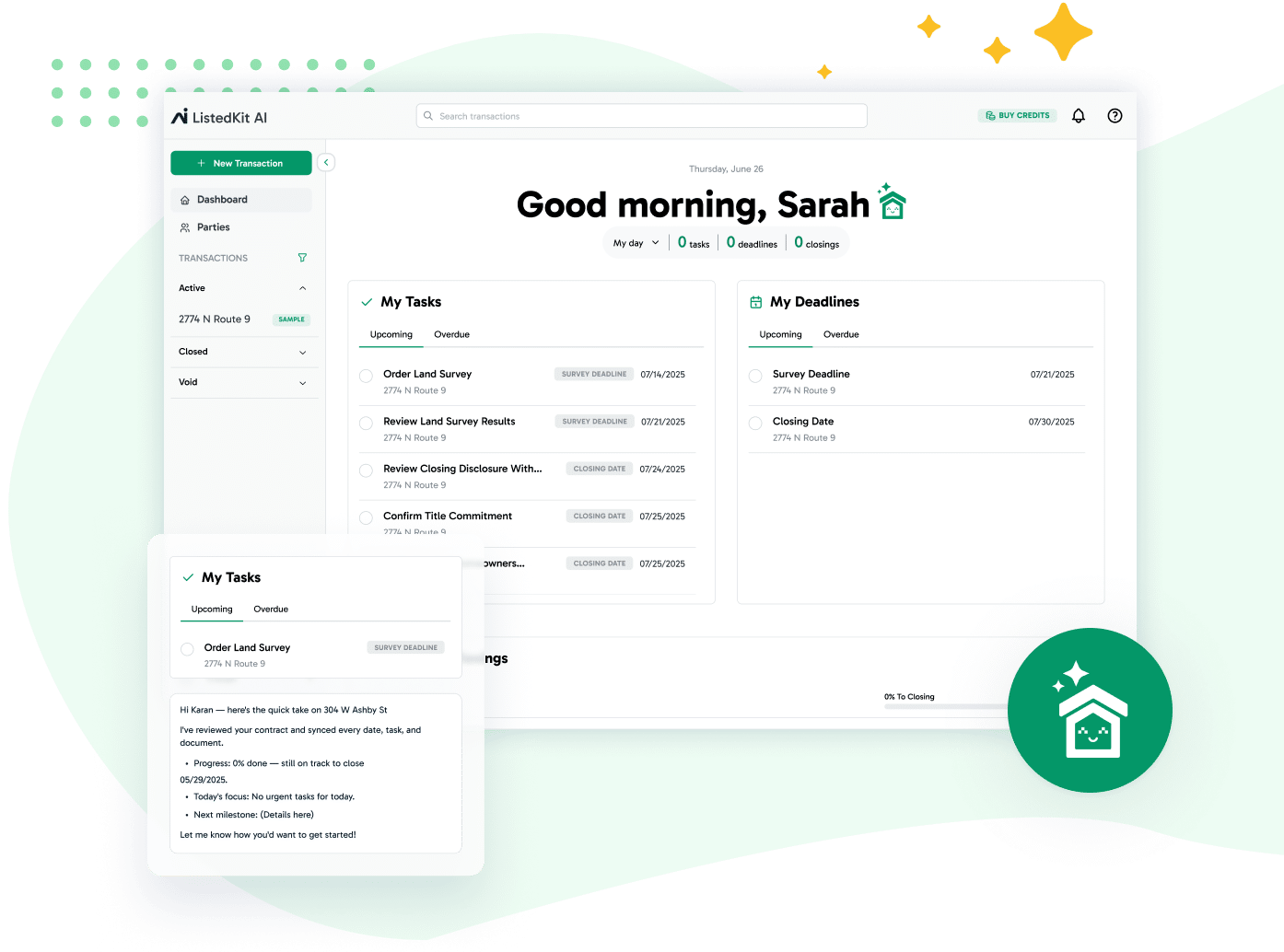Owning a small business in real estate, like operating as an independent TC, is rewarding. You have to help agents handle more transactions and clients. But it’s also greatly demanding. While agents entertain client relationships and focus on the bottom line of closing deals, you’re the powerhouse managing the paperwork, compliance, deadlines, and communication that keep transactions on track.
At the same time, the detailed nature of your work can easily lead to burnout if you’re not cautious. That is why stress management and strategies that prevent burnout are very important.
These five tips set you up for success as a small business owner in real estate without sacrificing your well-being.
1. Master Task Prioritization with a Daily System
Running a real estate business as a small business owner means constantly managing competing priorities. Without a structured system, you risk spending valuable time on less critical tasks, pulling focus away from your business goals. A well-planned prioritization strategy helps you stay productive, organized, and in control of your workload.
Key Strategies:
- Establish a Workflow Backbone: Use powerful tools like ListedKit to centralize and streamline your task management. A centralized system eliminates confusion and ensures your energy is directed toward high-impact activities.
- Adopt the 80/20 Rule: Focus on the 20% of tasks that yield the most value for your business performance—such as meeting compliance deadlines or addressing client concerns—while delegating or scheduling less critical activities for quieter periods.
- Set Checkpoints in Your Morning Routine: Dedicate 10 minutes at the start of your day to plan your daily tasks and another 10 minutes in the evening to review your progress. These short “in-between time” sessions help you anticipate challenges and maintain clarity.
- Block Chunks of Time for Focus: Allocate specific blocks of time for focused work, such as drafting emails, updating compliance logs, or reviewing documents. Tackling one task at a time improves efficiency and reduces the stress of multitasking.
- Use Visual Cues: A color-coded task management system helps you prioritize at a glance, flagging urgent deadlines, key milestones, or administrative tasks that support broader business goals.
Example:
Imagine starting your day with a prioritized checklist, with blocks allocated for focused work like compliance tracking or client updates. This approach eliminates guesswork, ensuring your business operations run smoothly while leaving adequate time for high-level planning.
By aligning your morning routine with your workflow, you can effectively handle daily challenges, create space for quality time with stakeholders, and achieve greater progress toward your business goals.
2. Leverage Communication Templates to Save Time
As a small business owner in the real estate industry, maintaining clear and consistent communication with agents, title companies, clients, and other stakeholders is essential. However, repeatedly crafting similar messages can sap your energy and eat into your valuable time, leaving less room to focus on your larger business goals.
Using communication templates allows you to standardize your messaging, save time, and deliver polished, professional responses. This improves your business practices and enhances the client experience by ensuring timely and accurate updates.
Key Strategies:
- Standardize Emails and Updates: Develop templates for frequently used communications, such as kickoff emails, reminders for missing documents, updates on the settlement statement, and scheduling details. Templates save you adequate time and ensure your messaging is consistent and thorough, reducing unnecessary back-and-forth.
- Automate Where Possible: Leverage software tools like ListedKit to auto-fill transaction-specific details, such as property addresses, sale prices, or deadlines. Automation ensures accuracy while freeing up time for higher-priority tasks.
- Balance Personalization and Efficiency: Avoid generic or robotic-sounding emails using placeholders for personalized elements like names, warm greetings, or transaction-specific notes. This keeps your communication professional yet relatable.
- Prepare Templates for Complex Scenarios: Build templates for less common but critical situations, such as explaining wire fraud precautions, addressing financial discrepancies, or clarifying closing costs. Pre-prepared responses ensure you can handle these scenarios confidently and without unnecessary stress.
- Use Attention-Grabbing Subject Lines: Craft precise, professional subject lines that highlight the purpose of the email, such as “Action Needed: Missing Buyer Signature for 123 Main Street” or “Status Update: Title Work Completed for [Property Address].” A strong subject line sets the tone for efficient communication and helps stakeholders prioritize your message.
Example:
Suppose an agent contacts you while rushing between client meetings to ask about the status of a transaction. Instead of starting from scratch, you use a pre-built template that populates key details, such as the buyer’s loan pre-approval, title work status, and upcoming deadlines. The agent quickly gets the information they need, allowing them to focus on their next appointment while you save valuable time for other tasks.
By implementing templates, you streamline your communication process and ensure your business operation runs efficiently, freeing up your schedule to focus on strategic growth and nurturing business relationships.
3. Stay Ahead with Compliance Tracking
Missing a key document, deadline, or requirement can disrupt a deal, lead to penalties, or even result in legal issues. These mistakes risk financial consequences and damage the trust you’ve built with agents and clients.
Proactive compliance tracking ensures all regulatory requirements are met, protects everyone involved, and keeps transactions moving forward. Your diligence and reliability as a small business owner demonstrate your value as a dependable business partner in the real estate industry.
Key Strategies:
- Implement Checklists for Compliance Tasks: Create detailed checklists tailored to each transaction, covering essential items such as verifying signatures, ensuring all forms are properly completed, and tracking loan approval deadlines. Tools like ListedKit make managing these tasks seamless and efficient.
- Schedule Regular Compliance Reviews: Dedicate blocks of time each week to review transaction files, ensuring they meet all state and local regulations. Catching issues early prevents last-minute scrambling and protects your business performance.
- Streamline Document Management: Use digital platforms to store and organize transaction documents. A centralized system ensures files are easily accessible during audits or inquiries.
- Monitor Deadlines Using Alerts: Automate reminders for critical deadlines, such as escrow deposits, buyer milestones, or settlement statement reviews. These automated alerts free up your mental bandwidth for other high-priority tasks.
- Develop a Standardized File Naming System: To prevent confusion, create consistent naming conventions for transaction documents. For example, label files with the property address, client name, and document type (e.g., “123Main_BuyerSignature.pdf”). This system helps you locate files quickly during client meetings or when working with real estate investors and attorneys.
Example:
Suppose you dedicate 2–3 hours weekly to a compliance review session. During this time, you systematically ensure every transaction meets regulatory standards, identifying and resolving discrepancies before they escalate. This habit reduces stress, improves business practices, and reassures agents that compliance is always controlled.
4. Set Boundaries and Delegate Strategically
Without clear boundaries and effective delegation, your workload can lead to delays, oversights, and burnout—not only for you but for the stakeholders who rely on your expertise.
Strategically setting boundaries and delegating tasks protects your energy and keeps you focused on high-value activities, such as tracking deadlines, maintaining compliance, and addressing potential issues. These practices allow you to perform at your best while running your business smoothly.
Key Strategies:
- Define Your Work Hours: Communicate your availability clearly to agents, clients, and other stakeholders. Let them know when you’re reachable and when you’re off-duty. This prevents unnecessary interruptions and lets you maintain mental clarity during working hours.
- Delegate Admin Tasks: Assign repetitive tasks like data entry, file uploads, and document organization to team members, assistants, or virtual assistants. Freeing yourself from these time-consuming responsibilities lets you focus on core transaction duties directly impacting your business performance.
- Communicate with Confidence: When setting boundaries or delegating, explain how these decisions improve quality and focus. Reassure clients and agents that these adjustments help you prioritize their needs effectively.
- Batch and Outsource Non-Core Duties: If your workload includes tasks like managing online listings or scheduling, try batching these tasks for efficiency or consider outsourcing them entirely. This creates uninterrupted time for critical transaction-related work.
- Establish a Crisis Management Plan: Create a process for handling urgent requests outside your regular hours. For example, set up a dedicated “urgent requests” channel to address emergencies without disrupting your boundaries or personal time.
Example:
Imagine setting your work hours from 9am to 5pm. An agent contacts you at 8 p.m. with a non-urgent question. Thanks to your clearly communicated boundaries, you confidently respond the next day without feeling pressured.
Meanwhile, delegating routine tasks like document uploads to a virtual assistant lets you focus on compliance reviews and deadline tracking during the day.
5. Invest in Your Own Professional Growth
Investing in professional development enhances your skills and equips you to anticipate challenges and deliver innovative solutions. This commitment to growth strengthens your reputation as a reliable and indispensable partner for agents and clients.
When you take proactive steps to expand your knowledge and expertise, you improve the efficiency and quality of your services, ultimately driving smoother transactions and building trust within your network.
Key Strategies:
- Stay Updated on Industry Tools: Explore transaction management platforms like ListedKit to streamline workflows, automate repetitive tasks, and improve communication. Keeping up with the latest tools ensures you remain competitive and efficient in a fast-evolving market.
- Seek Feedback from Stakeholders: Ask agents or clients for input on your processes, such as compliance tracking or communication methods. Their insights help refine your business practices and strengthen relationships, making you more effective and adaptable.
- Join Professional Communities: Engage with forums, webinars, or local groups tailored to real estate transaction coordinators. Networking with peers provides fresh perspectives, tips, and strategies for tackling challenges and improving your business structure.
- Pursue Advanced Training or Certifications: Deepen your expertise through real estate certification programs or specialized courses. These credentials not only expand your knowledge of compliance, buyer journeys, or market dynamics but also position you as a leader in the real estate industry.
- Develop a Resource Library: Build a personal library of tools, templates, and guides to draw upon when challenges arise. Whether it’s a checklist for compliance tasks or insights into real estate investing, having a curated resource collection ensures you’re prepared for any scenario.
Managing Stress is Key to Business Success in Real Estate
Effectively managing stress enhances your performance as a small business owner while solidifying your role as a reliable partner in the real estate industry. By adopting these strategies, you can streamline your workflows, build trust with agents and clients, and contribute to seamless and successful transactions while safeguarding your well-being.
Recap of the 5 Essential Hacks to Prevent Burnout:
- Master Task Prioritization with a Daily System: Focus on high-impact tasks and use powerful tools to manage deadlines, reduce mental clutter, and stay organized.
- Leverage Communication Templates to Save Time: Standardize and automate routine messages to maintain professionalism, efficiency, and consistency in your communication.
- Stay Ahead with Compliance Tracking: Use checklists, monitor deadlines, and organize documents to meet regulatory requirements, reduce risks, and avoid delays.
- Set Boundaries and Delegate Strategically: Clearly define work hours, delegate repetitive tasks, and focus on high-value activities to reduce stress and improve your business operation.
- Invest in Your Own Professional Growth: Stay informed about the latest tools and trends, engage with professional communities, and continually enhance your expertise to remain a dependable partner in the real estate business.
Join ListedKit’s newsletter for expert tips and tools to help your TC business succeed.




